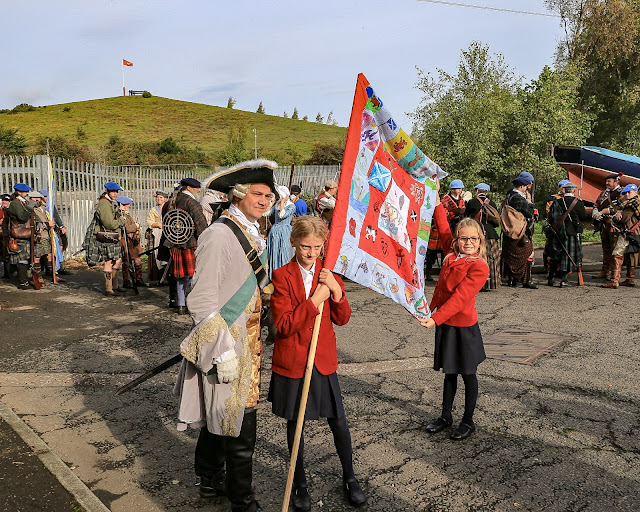On the 17th September 1745 Charles Edward Stewart
and his Jacobite army took Edinburgh, all except the castle because of its
strategic position, with very little bloodshed or opposition. The Princess
father James was proclaimed King of Scotland.
The same day Sir John Cope and his Hanoverian army landed
along the coast at Dunbar with the aim of recapturing Edinburgh. He based his
army between Tranent and Prestonpans to await reinforcements.
The Jacobite army saw their opportunity to route King George
11s troupes and start their march into England to take London and return the
crown to the Stuart Royal family. Their
followed on the 21st September 1745 what has become known as The
Battle of Prestonpans where against all odds the Jacobite Highlanders swept to
victory.
The Scottish Battlefield Trust brought these and other
events to life at the East Lothian Battle Weekend at Greenhills Prestonpans on
the 15/16th September 2018.
The Grand Commemorative Parade departed from the battlefield
site at Meadowmill Sports Centre through streets with names associated with the
battle.
Amongst these taking parts in what turned out to be a very
colourful parade where representatives of clans who fought for the Prince,
British army regiments that fought on the side of George 11 and local school
children who made flags specially for the occasion.
A commemoration of remembrance took place when the
procession reached Greenhills reminding us all of the sacrifices made by these
that fought in the battle.
The first of the re-enactments was the Raising of the Royal Standard
of the Stuarts at Glenfinnan on the 19th August 1745 where the
Prince invited the Highland Clans to join him in his great adventure to reclaim
the thrones of Scotland, England and Ireland.
A cavalry display and manoeuvres by Johnnie Cope’s Redcoats
followed.
Prince Charles and his officers prepares for the forthcoming battle with a
war council.
Bagpipes fill the air in anticipation of the coming battle.
Pre-battles skirmishes.
The two armies that
faced each other on September 2st 1745 could hardly have been more different.
On the one hand, the official army of the British state, loyal to the
Hanoverian king George 11. It was uniformed, paid and trained. In its ranks
were Scots, English and Irish soldiers, resplendent in their scarlet coats and
reliant upon disciplined firepower.
Against them stood an
army which had barely existed a month, mostly Gaelic speaking Highlanders from
the northwest of Scotland. Many of these with muskets knew little of how to use
them, whilst others relied upon their skill with the broadsword of Lochaber
axe. (Event Programme)
These brave Highlanders were here for the exiled Stuart King
James and to fight behind his son Charles Edward Stewart. It had taken them
four weeks of campaigning and some long marches across Scotland to bring them
face to face with the government forces. After some minor skirmishes the battle
was over in very swiftly.
There were very few casualties suffered among the Jacobites
but the redcoats died in their hundreds, 1200 were killed or wounded and 1800
taken prisoner. Johnnie Cope and what were left of his army fled all the way to
Berwick-upon-Tweed. The way was now open for the invasion of England and its
capital city.











































No comments:
Post a Comment